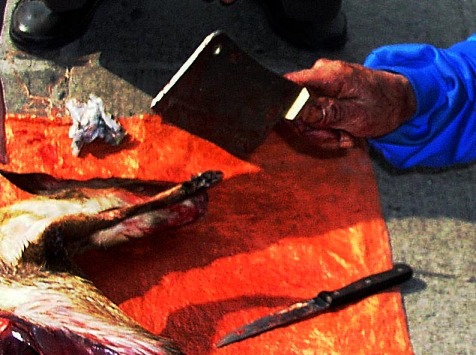Knives
On the flight from Amsterdam to Casablanca September 1, 2001 a woman sitting across the aisle used a small knife to skin an apple. Her right thumb measured thin red working a blade down fruit.
She was delicate and firm manipulating the sharp tool. Observing others using a sharp edge I remembered her.
One winter afternoon as the sun sang past Sierra Mountains, a man on a cane labored uphill to a gazebo overlooking Grazalema with his small dog. We exchanged pleasantries.
He pulled a folding blade out of a crumpled brown sweater pocket and a pear in a white paper napkin. He had the same precision as the woman. Finished slicing a piece he kept it on an edge eating off steel. He tossed the core to his barking mongrel, wiped the blade, folded it, pocketed it and stabilized himself to the potable water stone fountain. He removed his upper teeth, washed them, put them back in his face and wiped his mouth with the napkin.
Garcia the village Fleischer had the skill.
Grazalema families had it butchering pigs on plywood slabs in their garage on freezing January mornings as laughing women flayed with surgical precision. Disemboweled pigs covered the floor. A man stirred a steaming cauldron removing fat from bones.

A cafe man with a long thin blade slicing strips of ham off pig bones for hungry Seville day-trippers had it.
In February 2002 friends butchering sheep in Casablanca for Eid al-Adha, or “Feast of the Sacrifice” had it. Sacrifice with a capital S. Abraham dreamed he wanted to kill his son and God said, “No, I will send you a ram.”
Three sheep were slaughtered, one for each married man in the family. The sheep spent their last night in the furniture factory attached to a warren of rooms constituting the family home in an industrial part of town.
We started at 9 a.m. after a breakfast of crepes and tea. Ahmed, Tofer, Saad, and their father secured wooden beams and ropes above a red and gray tile floor. We held the first sheep down and sliced its throat. Breath and blood flowed across checkerboard tiles.
The head was severed and thrown to the side. We cut a hole in a back leg near tendons and bone, ran a rope through and hoisted the carcass. Covered in blood, laughing, sweating and struggling we raised the carcass into blue sky.
Blood paints tiles. Rex II the German shepherd drank his fill.
Sliced wool coats were thrown on a ladder to dry in the sun. They’d be collected by a man and made into family prayer rugs.
We inflated the body with an air compressor to facilitate skinning. Blades were honed. We worked fat off the skin of the poorest animal.
Organs tumbled into plastic tubs. Women carried them to a kitchen upstairs. The interior cavity was washed with hot water. Large sections were cut up with a band saw, wrapped in plastic bags and frozen.
Liver skewered with fat was grilled over red-hot coals and served at noon with tea, bread and olives. We ate in the shade of pink and red bougainvillea flowers. Casablanca was dead quiet.
At 3 p.m. we swallowed the stomach with lemon, olives, fresh bread, fruit and water.
Across the street itinerant men cooked sheep heads on a makeshift grill of coals with synesthesia.
The sound I saw
Smells a lamb’s head crying
Music of embers
Wool glazed eye calm
Cadence of a blade
Releasing blood
Touch hears the poorest skin
White intestines
Black liver on red coals
A single piece of charcoal
Welcomes a skull
Horns curve from blue sky
Into quivering dark-eyed knives
Slashing flesh
The feast lasted three days.
Sacrifice with family and hospitality.
Knife art.

ART
Adventure, Risk, Transformation - A Memoir

 Share Article
Share Article